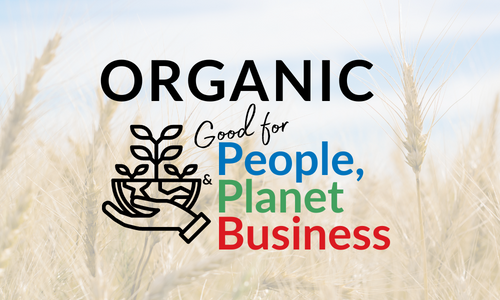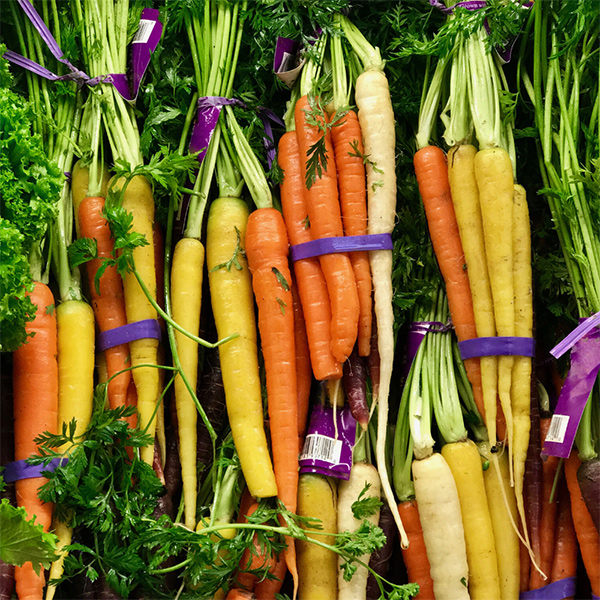The threat that climate change poses to our world, our ecosystem and our health demands bold policy solutions, and, as the devastating impacts of a warming Earth mount, the push for the development of robust and comprehensive federal climate policy is gaining traction. Organic agriculture can be a part of the solution and help tackle climate change through its ability to reduce greenhouse gas emissions, store away huge amounts of carbon, and enable farmers to be resilient in an evolving climate.
Many businesses have implemented innovative programs and initiatives that support climate change mitigation while strengthening their own supply chains and brand identities. Soil health is a particular focus for many companies, and some have resulted in programs that pay farmers directly for sequestering carbon in their soil. Sustainability efforts touch the entire value chain, with some companies requiring more sustainable packaging, buying local goods when available, avoiding plastic, using more renewable energy, and reducing food waste. Other companies offset their carbon footprint by planting and protecting carbon sinks in the developing world, providing sustainable livelihoods to disadvantaged communities.
LISTEN: In case you missed it, watch the recording of Food Tank's podcast on how we are advancing organic as a climate change solution.
Blue
U.S. Climate Policy & Organic Agriculture
Presented Thursday, August 27, 2020
The second in Organic Trade Association’s summer Webinar series on climate change will begin with a scientific grounding in the connections between organic practices and associated increases in soil carbon, and reductions in nitrogen pollution. From there, members of the trade association’s Board of Directors will share news about the Board’s recent work on policy principles to support organic as a key to mitigating climate change. Panelists will discuss legislation introduced in the U.S. House and Senate that prioritizes agricultural solutions, as well as a new report from the U.S. House Select Committee on the Climate Crisis.
- Esteemed Panelists:
- Megan DeBates, Organic Trade Association (discussion leader)
- Avi Garbow, Patagonia Works
- Britt Lundgren, Stonyfield Organic
- Jessica Shade, Ph.D., The Organic Center
Complimentary to OTA members
Not-yet member registrations: $149
REGISTER NOW
Organic & Climate – Breakthrough Progress in the EU
Presented Thursday, July 30, 2020 (75 minutes)
As part of its effort to become climate neutral by 2050, the EU's Green Deal calls for 25% of Europe's agriculture to be transitioned to organic (nearly triple the current area) by 2030. Join us to learn more about this bold effort to create a fair, healthy and environmentally beneficial food system. We'll discuss how leaders in the organic movement were able to successfully advocate for organic's inclusion in this sweeping program. And we’ll hear from organic industry participants in the farming and processing/trade sector about priorities for specific action plans to implement and achieve the sustainability targets set out in the Green Deal’s Farm to Fork and Biodiversity Strategies.
- Esteemed Participants:
- Alexander Beck, Association of Organic Food Manufacturers eV (AöL)
- Ariane Lotti, Tenuta San Carlo Organic Farm
- Silvia Schmidt, IFOAM Organic Europe
- Johanna Mirenda, Organic Trade Association (Discussion Leader)
Complimentary to OTA members
Not-yet member registrations: $149
REGISTER NOW
Organic & Climate – Consumer Messaging for Maximum Impact
Presented Thursday, September 17, 2020
Climate change is one of the most difficult challenges facing us today. It is overwhelming to consider, and there doesn’t seem to be a lot of good news on progress. Agriculture is a major contributor to climate change – but not all agriculture. Shoppers care about organic’s proven climate benefit. We’ll discuss the most effective way to communicate with shoppers about organic’s ability to mitigate climate change, and hear from an iconic brand about how and why they are taking their climate mission directly to consumers.
- Esteemed Panelists:
- Alex Heath, Executive Vice President of Social Purpose | Edelman
- Angela Jagiello, Director of Education & Insights | Organic Trade Association
- Geoff Showers, Sr. Customer Manager | Clif Bar & Company
Complimentary to OTA members
Not-yet member registrations: $149
REGISTER NOW
Organic priorities in the climate change fight
Organic agriculture provides a critical opportunity to mitigate climate change and at the same time create economic, environmental and health benefits for all those involved in our food system--from the grower and the processor, to the distributor and the consumer. But although public and private initiatives to support organic as a climate mitigation tool exist, stronger federal support is needed for organic to reach its full potential to fight against climate change.
The Organic Trade Association’s Board of Directors early this year determined that organic had to be elevated in the climate change policy discussions that are increasingly taking place in the halls of Congress, in government offices, in corporate boardrooms. The Board also agreed that the Organic Trade Association, as the leading voice in the nation for the organic sector, should spearhead the effort to advance organic as a solution to climate change and to protect organic from the risk of climate change. A climate task force consisting of seven Board members was formed with the goal of developing principles for good climate policy to guide organic’s engagement in climate policy discussions.
In June at the association’s annual meeting, the Board unanimously endorsed ten principles for climate policy.
Blue
Any policy that addresses the role of climate change in food and agriculture should advance the opportunity for organic to be a climate change solution, allow organic to be successful, and not undermine organic.
Policy solutions should be based on and supported by science and data, with strong verification measures to meaningfully reduce agriculture’s impact on climate change.
Policies should reward the outcomes of good agricultural practices and enable a system of continuous improvement that achieves specific positive outcomes over time.
Improving soil health is an important and central component in addressing agriculture’s role in climate change. Policies should include provisions for advancing soil health and carbon sequestration.
Chemical fertilizers and pesticides are a key source of greenhouse gas emissions in agriculture. Climate policies should minimize the use of and eliminate the dependency on fossil-fuel based inputs, especially synthetic nitrogen fertilizers.
Policies should provide the resources to not only mitigate the impacts of climate change but also help the agricultural sector adapt to a changing climate.
Farmers should not have to bear the brunt when making transformational changes. Public and private sector programs should provide tools and resources to achieve outcomes through market-based incentives or financial payments that encourage conservation practices or ecosystem services.
Policies that increase greenhouse gas emissions or rollback progress in decarbonizing the economy and reducing emissions should be opposed.
Climate policies should foster diversity and innovation in farming systems, and provide incentives for increasing diversity in cropping systems.
Policies should address the environmental and economic inequities caused by climate change, and include ways to support disadvantaged communities in adapting to climate change.
Incorporating the Organic Trade Association’s guiding principles to fight climate change, the new white paper offers specific recommendations for policymakers to support organic farmers and encourage transition to organic farming as a key strategy for climate change mitigation.
U.S. communities, economies and ecosystems are under threat from climate change. Federal policies can help advance organic as a key solution by encouraging the adoption of organic practices and maximizing benefits for mitigating climate change. The Organic Trade Association and our members stand ready to engage and support federal lawmakers in advancing these recommendations.
- Specific policy recommendations in the white paper include:
- Elevating organic as a key voice in climate-smart agricultural policy;
- Establishing a national program to support transitioning organic farmers by reducing financial risks, improving market infrastructure development and increasing access to land;
- Developing a competitive grant program to provide technical services to organic and transitioning farmers to create better access to information about organic production methods that sequester greenhouse gases and improve crop yields.
- Creating a federal Healthy Soils pilot program, based on existing programs at USDA’s Natural Resources Conservation Service and the California Healthy Soils Initiative.
DOWNLOAD OUR CLIMATE WHITE PAPER DOWNLOAD THE 5-PAGE SUMMARY OTA COMMENTS TO SENATE OTA COMMENTS TO HOUSE OTA COMMENTS TO USDA OTA CLIMATE GRANT
Blue
“Our climate crisis is real, is immediate, and affects us all. It is clear that urgent action is needed to help us mitigate and adapt to this crisis. While the nation’s conventional agricultural sector’s emissions and practices contribute to our worsening climate, there is a time-tested climate solution that regenerates our soils, nourishes our communities, and safeguards our environment from harmful synthetic chemicals: organic agriculture. The Organic Trade Association, through the work of its members, the Climate Task Force and its research and analysis, will ensure that organic is well-positioned to play a leading and cost-effective role in stemming and ultimately reversing the effects of our changing climate.”
- Avi Garbow, Organic Trade Association Board member and Environmental Advocate for Patagonia Works.
“Among the many threats posed by the climate crisis, perhaps the greatest is the potential it has to impact food production. The good news is that organic farmers are already focused on building soil health and eliminating the use of synthetic fertilizers, two steps that can help agriculture shift from being a source of greenhouse gas emissions to being a net sink. At Stonyfield we are excited to be working with the Organic Trade Association’s Climate Change Task Force on advancing organic agriculture as a climate change solution. The climate change principles adopted by the association provide a roadmap for how federal policy can support climate mitigation and adaptation in agriculture.”
- Britt Lundgren, Director of Organic and Sustainable Agriculture at Stonyfield Farm
“As a company that has made organic food for over 30 years, Amy's has witnessed firsthand the inherent benefits of organic agriculture on the health of the planet. The Organic Trade Association’s Climate Change White Paper, through scientific research, provides a practical set of policy recommendations to make organic agriculture a bigger and more meaningful part of the climate change solution. We look forward to seeing the positive impact of this important work.”
- Paul Schiefer, Senior Director of Sustainability at Amy's Kitchen
Join our Climate Change Task Force
Join the Organic Trade Association’s new Climate Change Task Force to elevate the voice of organic in climate policies, advance organic as a solution, and protect organic from the risk of a changing climate. Congress has taken a renewed interest in climate policy, and momentum for transformative action to reimagine the U.S. economy to prevent the most devastating impacts of climate change is happening now. Pull up a chair at the table and join us to amplify the diversity and expertise of the organic industry in these groundbreaking discussions. The Climate Change Task Force will advocate for our climate priorities, establish partnerships with key stakeholders, and evaluate existing and future policy proposals and legislation against our principles for good climate policy.






